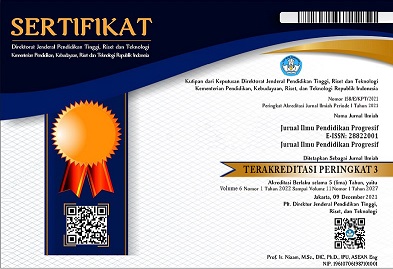| ..:: MAIN MENU ::.. |
| About The Journal |
| Focus & Scope |
| Peer Review Process |
| Author Guidelines |
| Publishing System |
| Privacy Statement |
| Copyright & License |
| Author Fees |
| Contact Us |
About the Journal
AIM and Scope
Jurnal Ilmu Pendidikan Progresif contains research publications in the field of education such as Model and Modelling, Integrated STEM Education, STEAM Education, Scientific Argumentation, Socio-Scientific Issue Based Teaching and Learning, Model Based Integrated Inquiry in STEM, Model Based Teaching and Learning, Curriculum and Instruction, Curriculum Ideology, Curriculum Development, Learning Progession, Learning Assessment, Computational Thinking, Bioinformatics Learning, Machine Learning, ICT Based Teaching and Learning, 21st Century Skills, Scientific Literacy, Teacher Ability, Professional Development, Teaching and Learning Based on Local Wisdom, Contextual Based Teaching and Learning, Technological Pedagogical and Content Knowledge, Pedagogical Content Knowledge, Teaching and Learning Based on Indigenous Knowledge, Teacher Education, Educational Policy, Character Education, and Systematic Review and Meta-analysis in Education. To have a direct impact on the development of the quality of education at the national and international levels, since 2021 all articles published in Jurnal Ilmu Pendidikan Progresif are required to have an impact on the development of the national curriculum in Indonesia or in each other country and also have a global impact. Since 2022, articles published in Jurnal Ilmu Pendidikan Progresif have mainly focused on education issues in the Indonesia context or related issues. However, research articles dealing with general educational issues outside the context of education in Indonesia are welcome.
Peer Review Process
The authors of the article have to pay attention to the following editorial policy provisions:
- The manuscript that has been published or in the process of publication on another publisher may not be submitted. The author should confirm that the manuscript has not been published or in the process of being published by other publishers (in sealed).
- Manuscript submitted in digital form to the Editorial Board of Jurnal Ilmu Pendidikan Progresif using the online submission provided on this website.
- Upon acceptance of the Editorial Board, the manuscript will be explored in general. Scripts which are considered incompatible with the mission of Jurnal Ilmu Pendidikan Progresif will be rejected at this stage, and will be communicated immediately to the author and the reason of disapproval.
- Manuscripts that pass the general study will be sent to at least two reviewers (blind reviewer) to be formally studied.
- Based on reviewers' comments and recommendations, the Editorial Board will make and communicate decisions regarding assessed manuscripts (accepted without revision, accepted with minor revisions, major revisions accepted, rejected due to the quality of writing and rejected because of ethical reasons writing scientific papers).
- Revised manuscript must be returned to the Editorial Board within a predetermined time. If the revised manuscript is sent past the deadline specified, it will be treated as new submissions.
Publication Frequency
Jurnal Ilmu Pendidikan Progresif published 12 times a year.
Open Access Policy
This journal provides immediate open access to its content on the principle that making research freely available to the public supports a greater global exchange of knowledge.
Publication Ethics Statement
Jurnal Ilmu Pendidikan Progresif managed by ojs.co.id. This journal is published twelve times a year. Editing in the publishing process of Jurnal Ilmu Pendidikan Progresif involves the role of Peer Reviewers.
Jurnal Ilmu Pendidikan Progresif has a high commitment in maintaining the highest standard in publication, including by upholding compliance to publication ethics. For this purpose, the Publication Ethics of this journal refers to the Regulation of the Head of Indonesian Institute of Sciences No. 5 of 2014 on the Code of Ethics of Scientific Publications. The Publication Ethics, which is intended to respond to cases of ethical misconduct in publications, is developed in four ethical standards, based on the parties participating in the production of a journal, which are Ethical Standard for Journal Manager, Ethical Standard for Editorial Board, Ethical Standard Peer Reviewers and Ethical Standard for Authors.
When it comes to implementation, articles that show lacks of compliance to the Publication Ethics will be denied publication in Jurnal Ilmu Pendidikan Progresif. To prevent violations of the Publication Ethics, the Editorial Board applies software to detect plagiarism practices. In any case where violations of the Publication Ethics of a published article is detected subsequently, the Editorial Board will file a report to the appropriate authorities.





